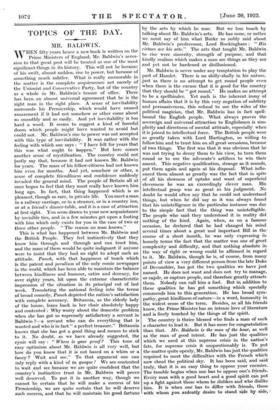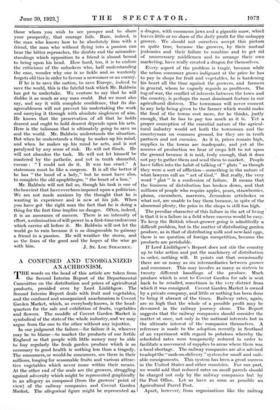TOPICS OF OF THE DAY.
MR. BALDWIN.
WHEN fifty years hence a new book is written on the Prime Ministers of England, Mr. Baldwin's acces- sion to that great post will be treated as one of the most significant things in its history. This will not be because of his swift, almost sudden, rise to power, but because of something much subtler. What is really memorable in the matter is the complete acquiescence not merely of the Unionist and Conservative Party, but of the country as a whole in Mr. Baldwin's tenure of office. There has been an almost universal agreement that he is the right man in the right place. A sense of inevitability surrounds his Premiership, which would have caused amazement if it had not somehow or other come about so smoothly and so easily. And yet inevitability is too hard a word. It seems to suggest a kind of forceful doom which people might have wanted to avoid but could not. Mr. Baldwin's rise to power was not accepted with this type of inevitability. It was rather with the feeling with which one says : " I have felt for years that this was what ought to happen." But here comes another sense of mystification. The country could not justly say that, because it had not known Mr. Baldwin for years. The mass of his fellow-citizens had not known him even for months. And yet, somehow or other, a sense of complete friendliness and confidence suddenly invaded the general mind. The people of Britain all at once began to feel that they must really have known him long ago. In fact, that thing happened which is so pleasant, though so rare, in private life. You meet a man in a railway carriage, or in a steamer, or in a country inn, or at a friend's dinner-table, and it is a case of attraction at first sight. You seem drawn to your new acquaintance by invisible ties, and in a few minutes get upon a footing with him which only exists for you in the case of two or three other people. " The reason no man knows."
This is what has happened between Mr. Baldwin and the British People. They feel instinctively that they know him through and through and can trust him, and the mass of them would be quite indignant if anyone were to insist that they had no right to adopt such an attitude. Punch, with that happiness of touch which is the patent and peculium of the only comic newspaper in the world, which has been able to maintain the balance between kindliness and humour, satire and decency, for over eighty years, hit upon the extreme characteristic impression of the situation in its principal cut of last week. Translating the national feeling into the terms of broad comedy, Punch depicted the nation's satisfaction with complete accuracy. Britannia, as the elderly lady of the house, leans back in her chair absolutely happy and contented : Why worry about the domestic problem when she has got so' supremely satisfactory a servant in Baldwin ?—a servant who can do everything that is wanted and who is in fact " a perfect treasure." • Britannia knows that she has got a good thing and means to stick to it. No doubt, as we have already suggested, the cynic will say : " Where is your proof ? This tone of easy optimism about Mr. Baldwin is all very well, but how do you know that it is not based on a whim or a fancy ? Wait and see." To that argument one can only reply with a kind of to quoque ! We are contented to wait and see because we are quite confident that the country's instinctive trust in Mr. Baldwin will prove. well deserved. To put it in another way, though we cannot be certain that he will make a success of his Premiership, we are quite certain that he will deserve such success, and that he will maintain his good fortune by the arts by which he rose. But we lose touch by talking about Mr. Baldwin's arts. He has none, or rather we must say of him what Burke so nobly said about Mr. Baldwin's predecessor, Lord Rockingham : " His virtues are his arts." The arts that taught Mr. Baldwin to rise were sincerity, strength of purpose, and that kindly realism which makes a man see things as they are and yet not be hardened or disillusioned.
Mr. Baldwin is never under any temptation to play the part of Hamlet. There is no shilly-shally in his nature, just as there is no attempt to get round people even when there is the excuse that it is good for the country that they should be " got round." He makes no attempt to be a spellbinder. Yet such is the inherent irony of human affairs that it is by this very negation of subtlety and persuasiveness, this refusal to use the wiles of the political magician, that Mr. Baldwin has in fact spell- bound the English people. What always proves the sovereign and universal attraction to Englishmen is sim- plicity and directness of mental attitude, especially when it is joined to intellectual force. The British people were so greatly taken with Lord Hartington, so willing to follow him and to trust him on all great occasions, because of two things. The first was that it was obvious that he- was not trying to decoy them to his view, to turn them round or to use the advocate's artifices to win their assent. This negative qualification, strange as it sounds, put them again and again at his disposal. What influ- enced them almost as greatly was the fact that in spite of all his slowness of uptake and want of superficial cleverness he was an exceedingly clever man. His intellectual grasp was as great as his judgment. No doubt he would often say that he could not understand things, but when he did 'say so it was always found that his unintelligence in the particular instance was due to the simple fact that the thing was unintelligible. The people who said they understood it in reality did nothing of the kind. Again, when, as on a famous occasion, he declared that he had changed his mind several times about a great and important Bill in the course of a short month, he was only expressing in homely terms the fact that the matter was one of great complexity and difficulty, and that nothing absolute in the way of right or wrong could be affirmed in regard to it. Mr. Baldwin, though he is, of course, from many points of view a very different person from the late Duke of Devonshire, has got the two qualities we have just named. He does not want and does not try to manage, or cajole, or capture people, and therefore greatly attracts them. Nobody can call him a fool. But in addition to these qualities he has got something which specially commends him to this generation. He has broad sym- pathy, great kindliness of nature—in a word, humanity in the widest sense of the term. Besides, as all his friends know, the Prime Minister has an intense love of literature and is finely touched by the things of the spirit.
The country is thrice blessed who finds a man of such a character to lead it. But it has more for congratulation than that. Mr. Baldwin is the man of the hour, as well as the man of good intent. He has just the qualities which we need at this supreme crisis in the nation's fate, for supreme crisis it unquestionably is. To put the matter quite openly, Mr. Baldwin has just the qualities required to meet the difficulties with the French which now cloud the political sky. It has been said, and said truly, that it is an easy thing to oppose. your enemies. The trouble begins -when one has to oppose one's friends. Every man with a good heart and a good spirit can put up a fight againit those =whom he dislikes and who dislike him. It is when one has to differ with friends, those with whoni you -ardently desire to stand- side -by side, - those whom you wish to see prosper and to share your prosperity, that courage fails. Rare, indeed, is the man who knows how to be absolutely firm with a friend, the man who without flying into a passion can bear the bitter reproaches, the doubts and the misunder- standings which opposition to a friend is almost bound to bring upon his head. How hard, too, it is to endure the criticisms of the onlookers who, half understanding the case, wonder why one is so fickle and so wantonly forgets old ties in order to favour a newcomer or an enemy. If he is to save the nation, to save Europe, indeed to save the world, this is the fateful task which Mr. Baldwin has got to undertake. We venture to say that he will dislike it as much as any man could. But we must also say, and say it with complete confidence, that its dis- agreeableness will not prevent his undertaking the work and carrying it through with absolute singleness of aim. He knows that the preservation of all that he holds dearest and ought to hold dearest depends upon his acts. Here is the talisman that is ultimately going to save us and the world. Mr. Baldwin understands the situation. But when he understands a thing he makes up his mind, and when he makes up his mind he acts, and is not paralysed by any sense of risk. He will not flinch. He will not abandon the task. He will not let himself be mastered by the pathetic, and yet in truth shameful, excuse : " I could not do it. It was too cruel." A statesman must be like a surgeon. It is all the better if he has " the hand of a lady," but he must have also, to complete the old apophthegm, " the heart of a lion."
Mr. Baldwin will not fail us, though his task is one of the heaviest that have ever been imposed upon a politician. We are not made anxious by the thought that he is wanting in experience and is new at his job. When you have got the right man the fact that he is doing a thing.for the first time implies no danger. Often, indeed, it is an assurance of success. There is an intensity of effort, a culmination of will-power in a first-time endeavour which carries all before it. Mr. Baldwin will not let the world go to ruin because it is so disagreeable to gainsay a friend in a passion. He will weather the storm, and so the fears of the good and the hopes of the wise go











































 Previous page
Previous page